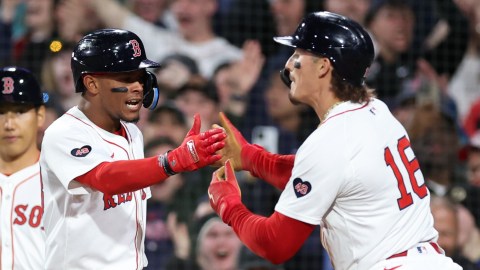When the Red Sox named Theo Epstein the youngest general manager in major league history in November 2002, the hope was that he’d be able to help accomplish what many before him couldn’t do: give the city of Boston a World Series title.
He did just that. Twice.
Yet after the Sox got swept by the Angels in the ALDS in 2009, missed the postseason in 2010 and then collapsed down the stretch in 2011, a lot of fans’ memories became somewhat clouded. The Boy Wonder who could once do no wrong became just as much a subject of scrutiny as anyone. It was a classic case of “what have you done for me lately?”
The criticism was understandable, as Epstein has tossed big money at players in recent years, and many of those players have never quite played to their full potential with the Sox. But why not lay the blame solely on those players who underperformed?
Sure, those players took (and take) the brunt of it, but the sky-high confidence that Red Sox Nation once had in Epstein diminished a bit in recent years to the point where he was no longer regarded as a larger-than-life figure. Suddenly, Epstein was just a good GM, not a hands-down future Hall-of-Fame GM.
But instead of harping on the Red Sox’ recent dark days, Epstein’s bold decision-making and aggressive nature, two much-needed qualities for the position that he held, need to be revered as the team gets set for life without the charismatic GM.
The Sox’ recent lack of playoff success is more the result of a lack of execution on the field than any wrongdoing on the part of Epstein or anyone in the front office. He consistently put the best product on the field — only the Sox have seen a reverse of fortunes when it comes to those transactions paying off.
The Sox had a solid foundation in place when Epstein took the reins in 2003, with Manny Ramirez, Pedro Martinez, Jason Varitek, Derek Lowe, Trot Nixon and Johnny Damon among those already in the fold. But in a one-month, five-day span in the winter of 2002-03, he added one of the most vocal leaders the team has ever seen, a batting champion and a potential future Hall of Famer in Kevin Millar, Bill Mueller and David Ortiz, respectively.
An ’03 midseason trade for Jeff Suppan, regarded as one of the big fish available at the time, didn’t quite pan out as hoped. But Epstein’s aggressiveness never waivered, as he went out and dealt for Curt Schilling and signed Keith Foulke the following offseason after watching the Sox suffer yet another close encounter with October glory.
It was the first real instance of Epstein and the new ownership showing off their win-at-all-costs mentality — a mentality that still holds true to this day.
But even those moves paled in comparison to Epstein’s decision to deal star shortstop and fan favorite Nomar Garciaparra to, ironically, the Cubs at the trade deadline in 2004. It wasn’t a hugely popular decision, but it eventually paid big dividends, as it helped springboard the Sox to their first title in 86 years.
Yes, Epstein also signed the likes of Edgar Renteria, Julio Lugo, J.D. Drew, Daisuke Matsuzaka and John Lackey, among others. But when you take his successful transactions into consideration, as well as his role in drafting Dustin Pedroia, Jacoby Ellsbury and Clay Buchholz, the positive decisions of his tenure far outweigh the negatives.
At the very least, Epstein’s moves have been a mixed bag. But it’s a mixed bag that’s been filled with a heavy batch of all-or-nothing. And more importantly, it’s been a mixed bag that’s helped lead the Sox to two World Series titles.
So while this season’s epic collapse might have left a bad taste in the mouths of Red Sox fans, it’s hardly the result of any wrongdoing on the part of the team’s now-former general manager. The Sox were again put in a position to win, and they were poised to do so for a better part of the season.
Epstein left on his own terms in order to pursure a new endeavor. And while someone like Ben Cherington, who knows the ins and outs of the Sox organization (having been in it since 1997), may be able to pick up right where he left off, we shouldn’t chalk it up as a foregone conclusion. Epstein is truly a special breed.
Nearly nine years, two World Series titles, a resignation and now a formal exit later, the book is closed on the Theo Epstein era in Boston. But it’s certainly been a book well worth reading.




